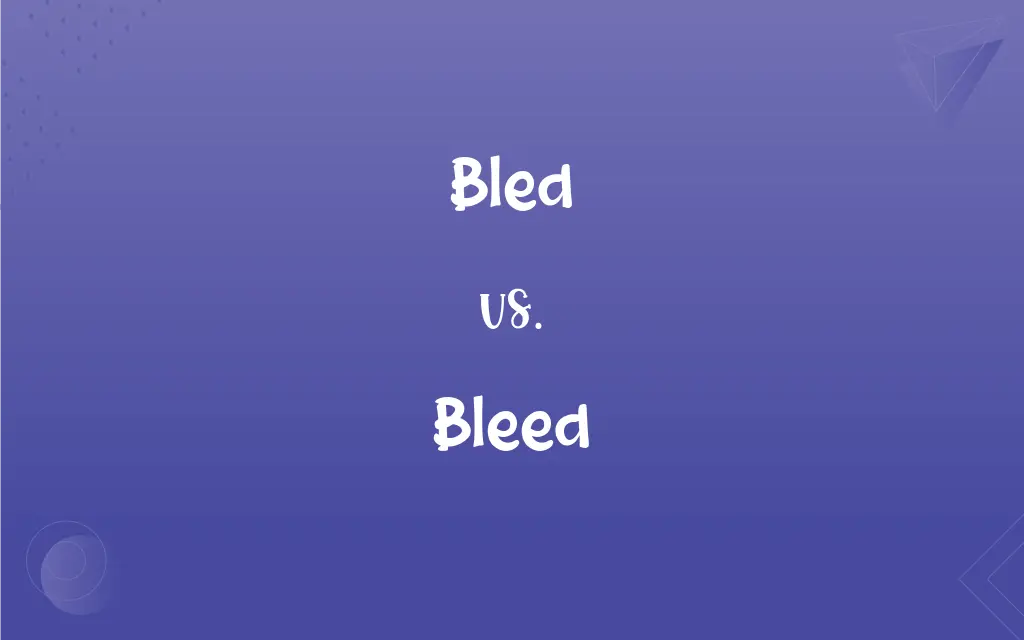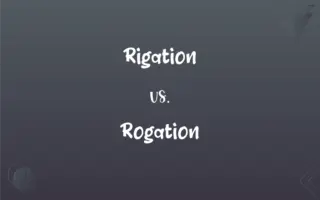Bled vs. Bleed: What's the Difference?
By Harlon Moss & Aimie Carlson || Updated on May 22, 2024
"Bled" is the past tense of "bleed," which means to lose blood. "Bled" indicates the action has already occurred, while "bleed" refers to the action happening in the present or future.

Key Differences
"Bled" is the past tense and past participle form of the verb "bleed." It indicates that the action of losing blood has already taken place. "Bleed," on the other hand, is the base form of the verb. It is used in the present or future tense to describe the act of losing blood.
"Bled" is also used in perfect tenses to indicate completed actions. For example, "She has bled a lot due to the injury," shows a completed action with relevance to the present. In contrast, "bleed" is used in continuous tenses, like "He is bleeding," to indicate an ongoing action.
"Bled" can also appear in passive voice constructions, such as "The wound was bled to remove infection," whereas "bleed" is used actively, such as in "The wound bleeds continuously."
In figurative language, "bled" might be used to describe past sacrifices or losses, such as "They bled for their country," while "bleed" can express ongoing or future sacrifices, like "We bleed money on repairs."
Comparison Chart
Verb Form
Past tense and past participle
Base form
ADVERTISEMENT
Tense Usage
Past
Present and future
Example Sentence
"He bled after cutting his finger."
"If you cut yourself, you will bleed."
Continuous Tense
Not used
"He is bleeding."
Figurative Language
Describes past sacrifices/losses
Describes ongoing/future sacrifices
Bled and Bleed Definitions
Bled
Removed blood from a body.
The wound was bled by the doctor.
ADVERTISEMENT
Bleed
Allow blood to flow.
The wound won't stop bleeding.
Bled
Suffered a loss or deprivation.
The company bled money last quarter.
Bleed
Suffer emotionally or physically.
He continues to bleed from the loss.
Bled
Experienced great emotional pain.
She bled emotionally after the breakup.
Bleed
To emit or lose blood.
Bled
Gave something valuable, often at a personal cost.
They bled for the freedom of their country.
Bleed
To be wounded, especially in battle.
Bled
To emit or lose blood.
Bleed
To feel sympathetic grief or anguish
My heart bleeds for the victims of the air crash.
Bled
To be wounded, especially in battle.
Bleed
To exude a fluid such as sap.
Bled
To feel sympathetic grief or anguish
My heart bleeds for the victims of the air crash.
Bleed
To pay out money, especially an exorbitant amount.
Bled
To exude a fluid such as sap.
Bleed
To run together or be diffused, as dyes in wet cloth.
Bled
To pay out money, especially an exorbitant amount.
Bleed
To undergo or be subject to such a diffusion of color
The madras skirt bled when it was first washed.
Bled
To run together or be diffused, as dyes in wet cloth.
Bleed
To show through a layer of paint, as a stain or resin in wood.
Bled
To undergo or be subject to such a diffusion of color
The madras skirt bled when it was first washed.
Bleed
To be printed so as to go off the edge or edges of a page after trimming.
Bled
To show through a layer of paint, as a stain or resin in wood.
Bleed
To take or remove blood from.
Bled
To be printed so as to go off the edge or edges of a page after trimming.
Bleed
To extract sap or juice from.
Bled
To take or remove blood from.
Bleed
To draw liquid or gaseous contents from; drain.
Bled
To extract sap or juice from.
Bleed
To draw off (liquid or gaseous matter) from a container.
Bled
To draw liquid or gaseous contents from; drain.
Bleed
To obtain money from, especially by improper means.
Bled
To draw off (liquid or gaseous matter) from a container.
Bleed
To drain of all valuable resources
"Politicians ... never stop inventing illicit enterprises of government that bleed the national economy" (David A. Stockman).
Bled
To obtain money from, especially by improper means.
Bleed
To cause (an illustration, for example) to bleed.
Bled
To drain of all valuable resources
"Politicians ... never stop inventing illicit enterprises of government that bleed the national economy" (David A. Stockman).
Bleed
To trim (a page, for example) so closely as to mutilate the printed or illustrative matter.
Bled
To cause (an illustration, for example) to bleed.
Bleed
An instance of bleeding.
Bled
To trim (a page, for example) so closely as to mutilate the printed or illustrative matter.
Bleed
Illustrative matter that bleeds.
Bled
An instance of bleeding.
Bleed
A page trimmed so as to bleed.
Bled
Illustrative matter that bleeds.
Bleed
The part of the page that is trimmed off.
Bled
A page trimmed so as to bleed.
Bleed
To lose blood through an injured blood vessel.
If her nose bleeds, try to use ice.
Bled
The part of the page that is trimmed off.
Bleed
(transitive) To let or draw blood from.
Bled
Simple past tense and past participle of bleed
Bleed
(transitive) To take large amounts of money from.
Bled
(in parts of French North Africa) Hinterland, field.
Bleed
(transitive) To steadily lose (something vital).
The company was bleeding talent.
Bled
Lost blood in the past.
He bled after the accident.
Bleed
To spread from the intended location and stain the surrounding cloth or paper.
Ink traps counteract bleeding.
Bleed
(transitive) To remove air bubbles from a pipe containing other fluids.
Bleed
(transitive) To tap off high-pressure gas (usually air) from a system that produces high-pressure gas primarily for another purpose.
At low engine speeds, valves open to bleed some of the highly-compressed air from the later compressor stages, helping to prevent engine surging.
High-pressure air bled from the APU is used to spin up the engines and run the APU generator and hydraulic pump, and can also be used to pressurise the cabin if necessary.
Bleed
To bleed on; to make bloody.
Bleed
To show one's group loyalty by showing (its associated color) in one's blood.
He was a devoted Vikings fan: he bled purple.
Bleed
To lose sap, gum, or juice.
A tree or a vine bleeds when tapped or wounded.
Bleed
To issue forth, or drop, like blood from an incision.
Bleed
To destroy the environment where another phonological rule would have applied.
Labialization bleeds palatalization.
Bleed
To (cause to) extend to the edge of the page, without leaving any margin.
Bleed
To lose money.
Most of the sectors are bleeding, particularly the resources sector.
Bleed
An incident of bleeding, as in haemophilia.
Bleed
A system for tapping hot, high-pressure air from a gas turbine engine for purposes such as cabin pressurization and airframe anti-icing.
When taking off at high altitude or at near-maximum weight, the bleeds have to be turned off temporarily, as they decrease engine power somewhat.
Bleed
(printing) A narrow edge around a page layout, to be printed but cut off afterwards (added to allow for slight misalignment, especially with pictures that should run to the edge of the finished sheet).
Bleed
(sound recording) The situation where sound is picked up by a microphone from a source other than that which is intended.
Bleed
The removal of air bubbles from a pipe containing other fluids.
Bleed
The phenomenon of in-character feelings affecting a player's feelings or actions outside of the game.
Bleed
To emit blood; to lose blood; to run with blood, by whatever means; as, the arm bleeds; the wound bled freely; to bleed at the nose.
Bleed
To withdraw blood from the body; to let blood; as, Dr. A. bleeds in fevers.
Bleed
To lose or shed one's blood, as in case of a violent death or severe wounds; to die by violence.
The lamb thy riot dooms to bleed to-day.
Bleed
To issue forth, or drop, as blood from an incision.
For me the balm shall bleed.
Bleed
To lose sap, gum, or juice; as, a tree or a vine bleeds when tapped or wounded.
Bleed
To pay or lose money; to have money drawn or extorted; as, to bleed freely for a cause.
Bleed
To let blood from; to take or draw blood from, as by opening a vein.
Bleed
To lose, as blood; to emit or let drop, as sap.
A decaying pine of stately size, bleeding amber.
Bleed
To draw money from (one); to induce to pay; as, they bled him freely for this fund.
Bleed
Lose blood from one's body
Bleed
Draw blood;
In the old days, doctors routinely bled patients as part of the treatment
Bleed
Get or extort (money or other possessions) from someone;
They bled me dry--I have nothing left!
Bleed
Be diffused;
These dyes and colors are guaranteed not to run
Bleed
Drain of liquid or steam;
Bleed the radiators
The mechanic bled the engine
Bleed
Lose blood.
If you cut yourself, you will bleed.
Bleed
Spread or diffuse.
The ink will bleed on the paper.
Bleed
Experience financial loss.
They bleed money on unnecessary expenses.
FAQs
What does "bleed" mean in medical terms?
It means to lose blood from the body.
How do you use "bled" in a sentence?
e.g., "She bled profusely after the accident."
How is "bleed" used in a future context?
e.g., "If you don’t apply pressure, the wound will bleed."
Can "bled" be used in present tense?
No, "bled" is the past tense and past participle form.
Is "bled" only used for literal bleeding?
No, it can also refer to financial or emotional losses.
Can "bleed" refer to something non-physical?
Yes, it can refer to emotional pain or financial loss.
What is a synonym for "bled" in financial terms?
A synonym could be "suffered a loss."
What part of speech is "bled"?
It is the past tense and past participle of the verb "bleed."
What is the past tense of "bleed"?
The past tense of "bleed" is "bled."
Does "bled" have a figurative meaning?
Yes, it can mean making sacrifices or enduring hardships.
What is an example of "bled" in past perfect tense?
e.g., "He had bled before help arrived."
How is "bleed" used in print media?
It refers to ink spreading or diffusing on paper.
Can "bleed" be used in passive voice?
Yes, but it typically appears in active voice.
What part of speech is "bleed"?
It is a verb.
What does "bleed" imply when talking about finances?
It implies incurring continuous losses.
Is "bled" ever used metaphorically?
Yes, e.g., "They bled for their rights."
Can "bleed" be used for non-human subjects?
Yes, e.g., "The radiator is bleeding fluid."
Can "bleed" describe a continuing action?
Yes, e.g., "He is bleeding heavily."
Is "bled" used in perfect tenses?
Yes, e.g., "She has bled a lot."
How do you use "bleed" in present continuous tense?
e.g., "He is bleeding from the cut."
About Author
Written by
Harlon MossHarlon is a seasoned quality moderator and accomplished content writer for Difference Wiki. An alumnus of the prestigious University of California, he earned his degree in Computer Science. Leveraging his academic background, Harlon brings a meticulous and informed perspective to his work, ensuring content accuracy and excellence.
Co-written by
Aimie CarlsonAimie Carlson, holding a master's degree in English literature, is a fervent English language enthusiast. She lends her writing talents to Difference Wiki, a prominent website that specializes in comparisons, offering readers insightful analyses that both captivate and inform.































































